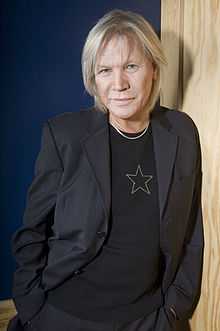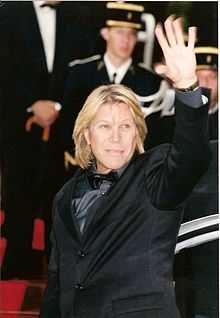Patrick Juvet
| Patrick Juvet | |
|---|---|
 | |
| Background information | |
| Born |
21 August 1950 Montreux, Switzerland |
| Genres | Disco |
| Occupations | Singer, songwriter, model |
| Years active | 1971–present |
| Website | http://patrickjuvet.fr |


Patrick Juvet (born 21 August 1950, Montreux, Switzerland) is a former model turned singer-songwriter, who had a string of hit records in France. While his early career was focused on making pop records, he found international success as a disco music performer in the latter half of the 1970s.
Biography
In Saint-Tropez he met French music producer Eddie Barclay, who allowed him to record a first single in 1971. He wrote Le Lundi au soleil sung by Claude François.
He represented Switzerland at the Eurovision Song Contest 1973 with "Je vais me marier, Marie," before charting in the U.S. / UK with the disco tracks, "Où sont les femmes?" and "I Love America" later in the 1970s. During his recording career in the 1970s, Juvet collaborated with French composer and musician Jean-Michel Jarre and noted disco producers Jacques Morali and Henri Belolo, who also produced Village People and The Ritchie Family, among other acts.
The aforementioned "Où sont les femmes?" was re-recorded in English under the title, "Where Is My Woman?", and was featured on Juvet's English-language debut on Casablanca Records in the U.S. Victor Willis, original lead singer of Village People, was the lyricist for the project.
His soundtrack score to David Hamilton's art house film Laura featured disco musicians Marc Chantereau and Slim Pezin of Voyage and Space session bassist Jannick Top. Although the music from Laura was never released on compact disc and was never released in the United States, it nonetheless sold 650,000 copies.[citation needed] Parts of the music were written and produced by the New Zealander Brian Southcombe (now deceased) who was once married to Charlotte Rampling. Southcombe, David Hamilton and another New Zealander "Glenn Holland". (Hamilton's business manager) were at one time actively trying to set up a sequel movie to Laura and are said to have approached Juvet for more music. Pictures from Laura and much other Hamilton art can be seen at the official "David Hamilton". web site.
With the decline of disco in the early 1980s, Juvet returned to the French music scene in 1982 with the album, Rêves immoraux. While selling respectably, the album failed to match Juvet's earlier commercial success. A time of financial and personal decline followed, with Juvet suffering periods of depression and alcoholism and relocating from mainland Europe to London, then to Los Angeles and finally, in the latter half of the 1980s, back to Switzerland.[1]
Juvet returned to Paris in 1991 and to his roots as a singer-songwriter with the album, Solitudes. The disc featured more personal, emotional songs with Juvet being accompanied by French language performers, Françoise Hardy, Luc Plamondon, and Marc Lavoine.[1]
In 2005, Juvet released his autobiography Les bleus au coeur, in which he explicitly talks about his bisexuality.[2]
Discography
Albums
- La musica (1972)
- Love (1973)
- Olympia 73 (1973)
- Chrysalide (1974)
- Mort ou vif (1976)
- Paris by Night (1977)
- Got a feeling (1978)
- Lady night (1979)
- Laura ou les ombres de l'été (1979)
- Live Olympia 79 (1979)
- Still Alive (1980)
- Rêves immoraux (1982)
- Solitudes (1991)
- Best of Patrick Juvet (1994) (Barclay)
- L'essentiel (2006)
Singles
- "Je vais me marier, Marie" (1973) (Eurovision Song Contest entry for Switzerland, 1973)
- "Toujours du cinema" (1973)
- "Rappelle-toi Minette" (1974)
- "Faut pas rêver" (1976)
- "Où sont les femmes?" (1977)
- "Megalomania" (1977)
- "Got a Feeling" (1978)
- "I Love America" (1978)
- "Lady Night" (1979)
- "Swiss Kiss" (1979)
- "Laura" (1979)
References
- ↑ 1.0 1.1 "Biography: Patrick Juvet". Radio France Internationale Musique. Retrieved 2007-08-17.
- ↑ "Les bleus au cœur de Patrick Juvet". Coljon, Thierry. Retrieved 2011-05-17.
External links
- (French) Official Patrick Juvet website
- (French) Biography, from Radio France Internationale
- (English) Biography, from Radio France Internationale
| Awards and achievements | ||
|---|---|---|
| Preceded by Véronique Müller with "C'est la chanson de mon amour" |
Switzerland in the Eurovision Song Contest 1973 |
Succeeded by Piera Martell with "Mein Ruf nach dir" |
|